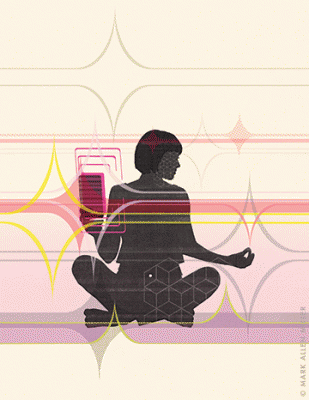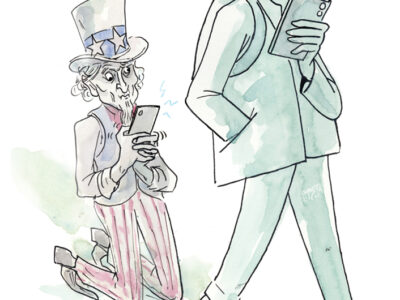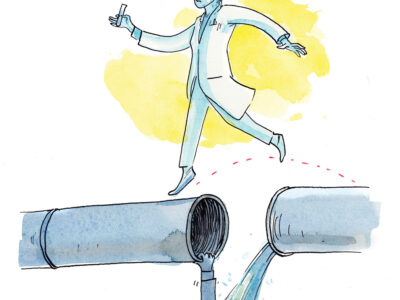
How to use your smartphone to protect your attention, rather than squander it.
By Alex Soojung-Kim Pang | Can information technologies protect our attention rather than distract us? Can they help us live richer lives, not just faster or more frantic ones? For most of us, our experience with computers, tablets, and especially smartphones tells us that the answer is no, that to reap the benefits of technologies we have to accept living in a state of “continuous partial attention,” as former Microsoft executive Linda Stone puts it. But as I argue in my book The Distraction Addiction, this isn’t the case. We can use our technologies to help us be more mindful, and practice what I call contemplative computing. By recognizing our tremendous natural-born ability to use technologies to extend our cognitive abilities and memory, by observing how today’s technologies do and don’t work, and by experimenting with new habits and practices, we can learn to use technologies more wisely.
It’s hard to remember that a decade ago smartphones didn’t even exist, given how quickly they’ve colonized our lives. According to a late 2014 study by the digital analytics firm Flurry, Americans spend an average of 3 hours a day interacting with their smartphones—more time than we spend watching television, on PCs, or tablet devices. (We spend 7 hours, 24 minutes looking at screens overall, according an estimate by analyst Mary Meeker. And that’s hardly an upper limit: Indonesians average 96 minutes per day more than we do.)
Checking our phones is a reflex, as anyone who’s watched students leave a classroom can testify. Further, a substantial number of people would rather give up sex or their cars than their phones. If we’re not actually addicted to these devices, we’re doing great imitations of people who are.
So why does this relationship go wrong? Some of the blame lies with game companies and app designers, who work tirelessly to create products aimed right at the dopamine receptors in our brains. But their tricks work because humans love tools. We’ve evolved with them, and evolved to use them. We have flexible wrists and dexterous fingers that can make and wield weapons with greater agility than any of our primate cousins; our forebears’ bodies shed the protection of thick hair as they learned to wear clothes and shoes; even our jaws and teeth have evolved to eat cooked rather than raw food.
Further, we’ve become so accustomed to using tools that our brains treat them as extensions of our bodies. The tip of a pencil feels like a part of the hand that wields it, and the same phenomenon can arise from a silicon chip. Finally, we get tremendous pleasure from mastering technologies. Whether they’re bicycles or violins or microcontrollers, they let us do things our unassisted bodies cannot, express ourselves in new ways, and briefly transcend our inborn physical and cognitive limits.
We know how to use tools; the problem is that our smartphones don’t know how to be good ones. Our natural inclination is to treat them as extensions of our selves—and sometimes that works just fine. For example, aside from those of my wife and children, I haven’t memorized a phone number in years, because I can trust my smartphone’s flawless recall. But other apps are designed to capture and resell my attention; and the more I interact with them, the better they get at distracting me. (I’m looking at you, Facebook.) Our phones are clever enough to grab our attention, but not smart enough to guard it, or know when we should be left alone.
The good news is, you can turn these weapons of mass distraction, these interruption amplifiers, into filters that protect your attention rather than compete for it.
Start by teaching your phone who has permission to interrupt you. People whose phones most effectively screen calls create a “whitelist” of immediate family, a few close colleagues, kids’ schools, or others who might call in an emergency—and that’s it. (I’ve observed in my research that the more high-tech your job, the smaller your whitelist is likely to be: I’ve interviewed engineers at Google and Apple whose lists consist of one or two people.) On iOS, you can use the Favorites list as a whitelist; there are several apps on Android phones that let you create both whitelists and blacklists.
Next, assign one ringtone for your whitelist, and a second for everyone else. I use the opening bars of Derek and the Dominos’ “Layla” for my whitelist, because even though I’ve heard it a million times, I notice that riff no matter what I’m doing, and I can be absolutely confident that someone I need to pay attention to is calling. Everyone else gets the opening bars of Brian Eno’s “Ambient Music for Airports,” which I’ll notice if I’m not busy, and is easy to ignore if I am.
It also helps to keep your phone close by, but not in your pocket. As many as two-thirds of smartphone users experience “ringxiety” or “phantom cellphone vibration,” the feeling that their cellphone is buzzing when it’s not. Stowing your phone in a bag or on a nearby surface, and turning off the vibration notification in favor of the little-known camera flash alert, helps with ringxiety. (The flash-not-vibrate feature is meant to assist the hearing impaired; on iOS devices it’s in the “Accessibility” section of the controls.) This also makes it just a bit harder to mindlessly reach for your phone; you’re more likely to interact with it when you really want to, not just out of habit.
Researchers recently found another reason to keep your phone out of sight: not only does multitasking degrade cognitive agility (even though it feels more productive), just having a phone nearby can be distracting enough to affect your work. Out of sight, clearer mind.
Another simple but powerful tweak is to change your backgrounds and lock screens. As part of its Bored and Brilliant campaign, for example, WNYC’s New Tech City created lock screens bearing messages like “Remember to Breathe” and “Do you really need to look at me?” People check their screens dozens or even hundreds of times a day, and such messages turn those little interactions into reminders to use the phone a bit more thoughtfully—what behavioral economists call nudges.
Finally, delete your distracting apps—those games and social networks you fire up waiting in line at the supermarket or sitting in traffic—and reclaim that time as an opportunity to let your mind wander. We lament technology’s effect on our ability to focus, but it has also eroded our capacity to be alone with our thoughts, and to daydream. This may not sound like a loss, but there’s great psychological value to letting your mind relax: it recharges your mental batteries, and it’s when your brain is most likely to generate unexpected insights or sudden answers to problems you’ve been working on.
Making these changes will turn your phone into a device that is mindful of you, so you can be more mindful in turn—of yourself, your surroundings, and others. It may take a little time to set up, but it will help you become more aware of the small but significant ways interactions are designed to capture your attention. You’ll get better at figuring out what’s helpful, what makes you more mindful, and what’s worth changing. And you’ll become more aware of your own practices and your mental state.
One thing that distinguishes world-class athletes is that they can play effortlessly on the field, but are also able to notice and adjust the finest details in the way they use their technologies. Great golfers, to take but one example, are mindful of tiny changes in their grip or stance. Jack Nicklaus and Ben Hogan even reported dreaming specific adjustments to their swing, which they then incorporated into their play. We spend so many hours a day with our phones, it can only benefit us to be more mindful about how we spend that time.
And we need to learn this now, because the devices we use to extend our minds and organize our lives are only going to get smarter, better able to observe and manipulate us, and more skilled at keeping us engaged even when we have more important things to do—or richer experiences to pursue. If you think your smartphone is a distraction, think how bad it will be when your email is pushed right into your line of vision, and games can make themselves harder or easier depending on your mood. The habits we develop to make our smartphones more mindful can help us keep from losing our minds in a future that threatens to be even more distracting.
Alex Soojung-Kim Pang C’86 G’88 Gr’91 is the author of The Distraction Addiction and blogs contemplativecomputing.org.




